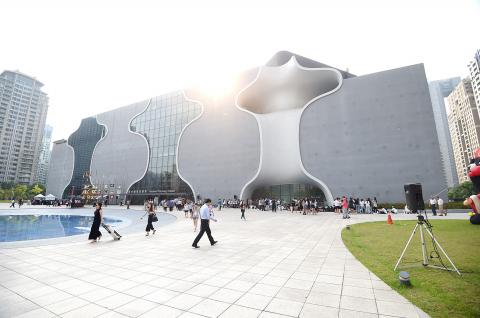The Taichung Metropolitan Opera House, which is to open on Sept. 30, will likely run a considerable deficit, the National Audit Office said, drawing the ire of city officials.
The Taichung City Government on Thursday last week donated the National Taichung Theater (Metropolitan Opera House) — designed by Pritzker Architecture Prize-winning Japanese architect Toyo Ito — to the Ministry of Culture.
The theater is likely to operate at an annual deficit of NT$150 million (US$4.7 million), the office said in a report and made suggestions for improving the theater’s operations.

Photo: Liao Yao-tung, Taipei Times
The report was based on last year’s assessment of the theater’s financial plan. It suggested that the theater completely overhaul its financial plan to improve the use of resources, adding that only 21 international performances are planned for this year.
The office said that the quality of performances should also be improved to appeal to a broader audience.
The ministry separately anticipated an annual loss of NT$200 million for the theater.
Democratic Progressive Party Taichung city councilors Chiang Chao-kuo (江肇國) and Yang Tien-chung (楊典忠) said the arts are not meant to be business endeavors, calling the office’s report “unbelievable.”
“The nation should be investing more resources to promote education in the arts. The National Audit Office views the government’s responsibility in promoting the arts as just running a business: They only pay attention to profits and losses. This is a narrow-minded approach,” Chiang said.
“The government should be thinking about how to use the resources at hand to develop the arts at a level appropriate for the population of central Taiwan,” Chiang said.
“And this is to say nothing of the superior quality of the facilities at the theater. The Ministry of Culture and the Taichung City Government should be thinking about how to positively develop soft resources,” Chiang added.
The office on one hand says that the financial losses by the theater will be a drain on the treasury, while on the other, it says that the number of international performances is too low, Yang said.
International performances are big expenditures and the office’s comments lead to a confusing situation in which it seems it is “wrong to spend money and wrong to save money,” he said.
He said he hopes that the office will not elevate arts in “Taipei while looking down on central and southern Taiwan.”
The theater is an official center for the performing arts and operates according to public policy, the theater’s vice supervisor for promotional affairs Lin Chia-feng (林佳鋒) said, adding that the policy comprises more than just selling tickets.
The Taipei National Theater and Concert Hall operated for more than 20 years before turning a profit, he said.
“Those outside of the arts should see the function of the arts as more than earning money. Although it is a venue for the performing arts, the theater also has a mission of assisting and fostering the development of local and national performance troupes,” he said.
“Initially we were aiming for a ratio of 40 percent international performances and 60 percent domestic. Some of that would account for programs held cooperatively with international performers. It is our hope to bring recognition to Taiwanese performance troupes,” he added.

Prosecutors in New Taipei City yesterday indicted 31 individuals affiliated with the Chinese Nationalist Party (KMT) for allegedly forging thousands of signatures in recall campaigns targeting three Democratic Progressive Party (DPP) lawmakers. The indictments stem from investigations launched earlier this year after DPP lawmakers Su Chiao-hui (蘇巧慧) and Lee Kuen-cheng (李坤城) filed criminal complaints accusing campaign organizers of submitting false signatures in recall petitions against them. According to the New Taipei District Prosecutors Office, a total of 2,566 forged recall proposal forms in the initial proposer petition were found during the probe. Among those

ECHOVIRUS 11: The rate of enterovirus infections in northern Taiwan increased last week, with a four-year-old girl developing acute flaccid paralysis, the CDC said Two imported cases of chikungunya fever were reported last week, raising the total this year to 13 cases — the most for the same period in 18 years, the Centers for Disease Control (CDC) said yesterday. The two cases were a Taiwanese and a foreign national who both arrived from Indonesia, CDC Epidemic Intelligence Center Deputy Director Lee Chia-lin (李佳琳) said. The 13 cases reported this year are the most for the same period since chikungunya was added to the list of notifiable communicable diseases in October 2007, she said, adding that all the cases this year were imported, including 11 from

China might accelerate its strategic actions toward Taiwan, the South China Sea and across the first island chain, after the US officially entered a military conflict with Iran, as Beijing would perceive Washington as incapable of fighting a two-front war, a military expert said yesterday. The US’ ongoing conflict with Iran is not merely an act of retaliation or a “delaying tactic,” but a strategic military campaign aimed at dismantling Tehran’s nuclear capabilities and reshaping the regional order in the Middle East, said National Defense University distinguished adjunct lecturer Holmes Liao (廖宏祥), former McDonnell Douglas Aerospace representative in Taiwan. If

The Mainland Affairs Council (MAC) today condemned the Chinese Communist Party (CCP) after the Czech officials confirmed that Chinese agents had surveilled Vice President Hsiao Bi-khim (蕭美琴) during her visit to Prague in March last year. Czech Military Intelligence director Petr Bartovsky yesterday said that Chinese operatives had attempted to create the conditions to carry out a demonstrative incident involving Hsiao, going as far as to plan a collision with her car. Hsiao was vice president-elect at the time. The MAC said that it has requested an explanation and demanded a public apology from Beijing. The CCP has repeatedly ignored the desires